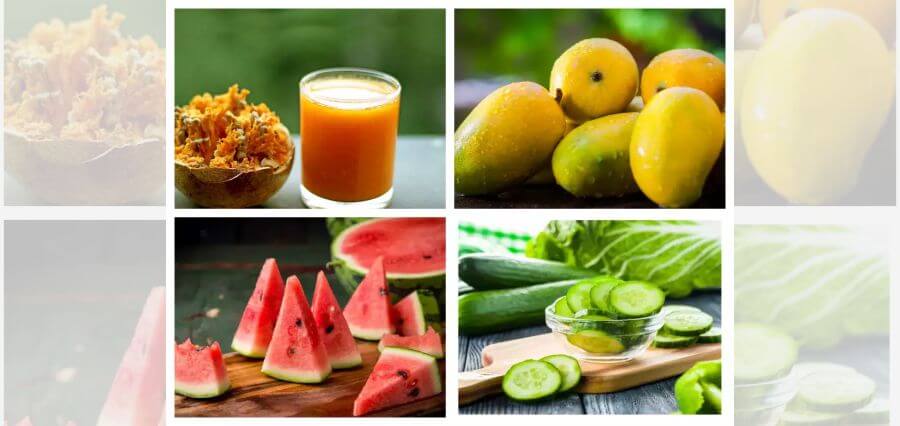People in the summer heat divide into several types: those who are ready to eat only the morning dew and sunshine, those who become frugarian for the whole three months, and people who don’t care about all that and continue to eat a burger. All three options are fundamentally different from the concept of a balanced and healthy diet for your body. To get your diet right in the heat, you also don’t need to eat five meals a day in portions of a sparrow. This is where balance is more important than money management at the live casino or meeting deadlines at work. To catch your inner zen and feel comfortable even in the hottest temperatures, here are nine rules for healthy eating in the summer heat.
Drink Lots of Water
Normally, we lose 2 to 2½ liters of fluids a day. Therefore, on normal days, we should drink about 6-8 glasses of water or other fluids.
The good news is that if you can’t drink water at all, you can replace it with a variety of sugar-free drinks, herbal infusions, your favorite teas, and homemade lemonades. Fruit juices and smoothies also count, but they should be limited to 150 ml per day because they contain natural, “free” sugars.
Listen to Your Body
If you lose your appetite in the summer, it’s normal. Intuitive eating is actively “chatting” at this point. Doctors point out that seasonal changes, including temperature and the number of daylight hours, affect our appetite. It tends to decrease in the summer, especially when we’re hot. One reason for this is that the body tries to regulate the temperature. It reduces heat-generating functions, such as digestion, as much as possible.
This reduction in appetite is beyond our control. But to avoid hunger and fainting during the summer walks, it’s necessary to consume food that is rich in essential nutrients.
Reduce Your Calorie Intake
Eat foods that make you feel full and satisfied. And your body won’t want to consume large amounts of calories. So, eventually, you’ll be able to lose those extra pounds as well. Don’t forget about vegetable fats. Avocados, nuts, and tofu will help satiate your body and supply it with the necessary elements.
Choose fruits, vegetables, and whole grains. Eat as many seasonal fruits as possible. Watermelons, cherries, strawberries, and raspberries will be great snack companions and won’t add extra pounds.
Look for healthier alternatives to the typical caloric summer treats. Buy fat-free and sugar-free ice cream. Or try sorbet. It’s a low-calorie, refreshing alternative to regular fruit ice. Experiment and remember to control your portions!
Eliminate Certain Foods From Your Diet
In hot weather, you shouldn’t play with fire. And if possible, exclude spicy, greasy, fried, and smoked food. It only increases sweating and is deposited on the body in the form of cellulite and problem areas. It’s better to give preference to various bowls, vegetable salads, avocados with cottage cheese, and whole-grain bread. As well as vegetables, grilled fish and poultry, and various light zucchini dishes.
Try to Eat Breakfast as Early as Possible
More specifically, before the heat wave hits. Try not to skip this basic meal. It will be the starting point of your entire daily diet. Of course, you shouldn’t eat breakfast with fruit. It’s better to save room for them at lunchtime. Eat carbs and fats in the morning. And add proteins if you wish.
Include More Vegetables in Your Diet
Vegetables are a perfect part of the summer menu. Zucchini, cucumbers, tomatoes, cabbage, peppers, and other vegetables can fully satisfy our need for vitamins, minerals, and nutrients.
Here’s a healthy recipe you can try: chop six stalks of celery, peel and peel one grapefruit. Mix the ingredients and season with one tablespoon of olive oil, one tablespoon of grated Parmesan, and season with salt and pepper. If you are eating this salad after your workout, add chicken breast to it.
Limit Your Salt Intake
During the heat, don’t overload the body with too much intensification of water-salt metabolism: the less salt we eat, the less we want to drink.
Cut zucchini into long thin slices with a vegetable peeler. Sprinkle it with lemon zest from a fine grater. Mix vegetable (grape, olive) oil with freshly squeezed lemon juice, add finely chopped chili peppers, and stir well. Season with olive oil and let the salad stand for about ten minutes. Strain the salad from the juices and serve.
Eat More Vitamins
The best source of vitamins is fruit and berries, and the best time to eat fruit is in the morning. Grapes, oranges, strawberries, raspberries, blackberries, apricots, plums, pears, peaches, melons, and other fruits, due to their ease of absorption by the body and rich in vitamins, are essential components of the summer menu.
Healthy Eating Isn’t Just Important in the Summer
To make healthy eating a habit, it’s important to make it easy and stress-free to eat right. Here are a few tips to help:
- Cook at home. It’s cheaper than eating out, and you’ll know exactly what’s on your plate. To speed things up, plan meals a week in advance and stock up on supplies.
- Cook with plenty of supplies. Don’t be afraid to leave food out for the next day; it can be frozen and then reheated.
- Choose seasonal fruits and vegetables. You don’t have to buy mangoes or avocados – the usual apples, bananas, and tomatoes also contain enough vitamins.
- Replace snacks with crunchy vegetables. Instead of chips, you can choose apple slices or carrot sticks.
- Form the habit gradually and take your time. If you push yourself too hard, the temptation to quit eating right will be too high. You can start with one vegetable a day and then develop the habit more strongly.
Read More: https://insightssuccess.com/


